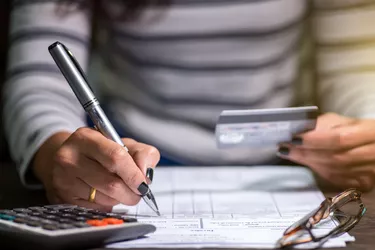
Debt can feel like an insurmountable obstacle sometimes. But one simple hack could help you start chipping away at that dollar amount. By paying a little more than the minimum on your interest-bearing debt each month, you can start making progress and pay off debt for good.
Tackling Credit Card Debt
Video of the Day
Those credit card charges and loans can be great for getting through tough times or making purchases you pay back later. But that monthly payment can cut into your budget, and you have to pay interest each month. If you make only the minimum payments on each of your interest-earning bills, you'll probably never get ahead, especially if you continue to take on debt.
Video of the Day
That's where paying more than the minimum can come in. Credit card companies and lenders know that many borrowers will only pay that amount each month, which is where they make a large chunk of money. In fact, consumers pay billions of dollars each year in credit card interest, giving credit card issuers an incentive to keep your minimum monthly payment low.
Consider also: The Maximum Penalty for Not Paying Credit Card Debt
Assessing Your Financial Situation
Putting more toward your bills can seem impossible when you simply can't squeeze another dime out of your budget. Before you consider any hacks, it's important to draw up a budget. Look at where you're spending each month and find little ways you can save money and put those funds toward your debt.
Another thing to consider as you review your budget is where your interest is going. If interest rates are low, debt consolidation loans can be a great way to reduce what you're spending each month, but only consider it if the fees and interest you'll pay will save you money, not take even more out of your bank account. For credit card debt, a balance transfer to one with a lower interest rate could be a quick trip toward debt consolidation.
Consider also: How to Pick the Best Credit Cards in 2022
Soon, you'll find you're putting less of your paycheck toward interest, which will give you more money to pay off debt and save for the future.
Generating Extra Money
After you've culled your budget and identified where you can trim, it might be time to bring in some extra income. A second job or side hustle can be a great way to get some extra money to make an extra credit card payment each month.
There are also some other ways to generate extra cash. Consider selling some of your possessions and putting that money into your debt repayment plan. Also, take a look at bills like your auto and homeowners' insurance and shop around for a better deal that will cut your premiums.
How Extra Payments Work
If you're considering extra payments as an answer to how to get out of debt, it's important to look at how much interest you can save every one or two years. If you have a $5,000 balance on a credit card with a 15 percent APR and you pay only $100 a month, you'll pay $1,357.95 in interest over a 24-month period. Here's how that looks if you pay extra.
- Pay $10 extra each month and pay $1,320.07 in interest
- Pay $50 extra each month and pay $1,168.54 in interest
- Pay $100 extra each month and pay $979.14 in interest
Consider also: Can the 15/3 Credit Card Hack Save You Money?
Focusing Your Efforts
The best thing you can do to streamline things is to pay off one debt, then put that monthly payment into paying off another. There are two major debt elimination approaches.
- Debt snowball method: With this method, you put your extra payment toward the smallest debt first, which gives you a sense of accomplishment once you've eliminated the outstanding balance.
- Debt avalanche method: This method targets the debt with the highest interest rate, paying off the balance, then moving to the debt with the next-highest interest rate.
You won't be debt-free overnight, but as you see your credit card balances shrinking, you'll start to feel a sense of accomplishment. Soon, you'll find you're putting less of your paycheck toward interest, which will give you more money to pay off debt and save for the future.